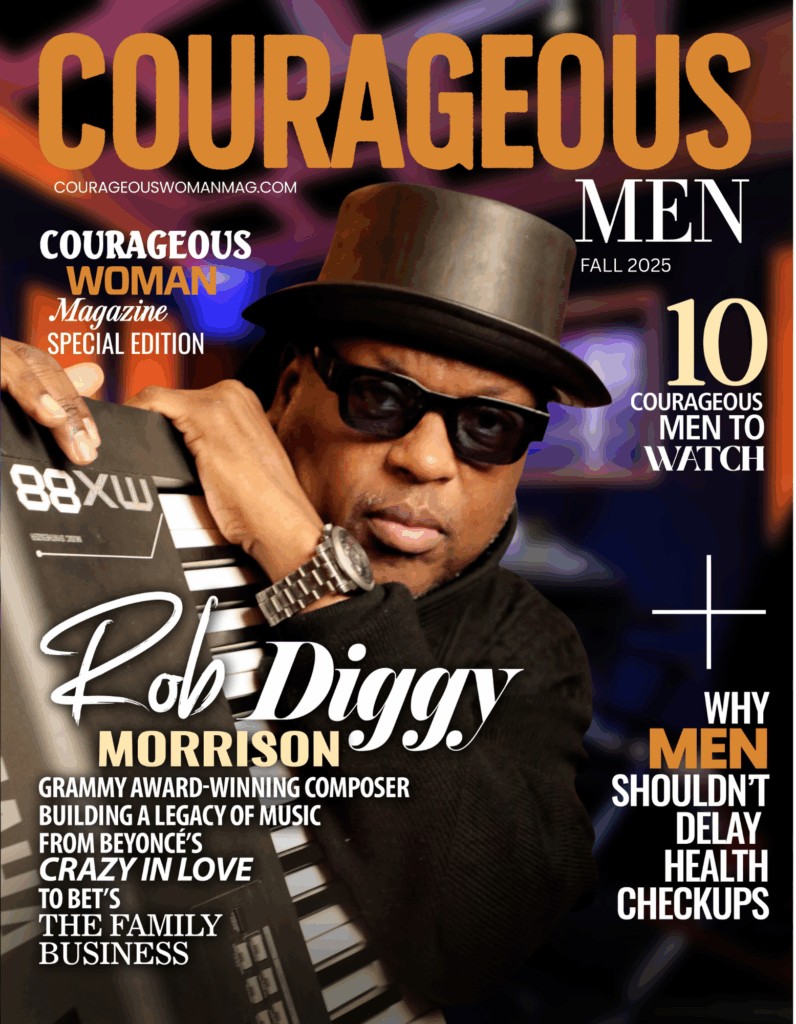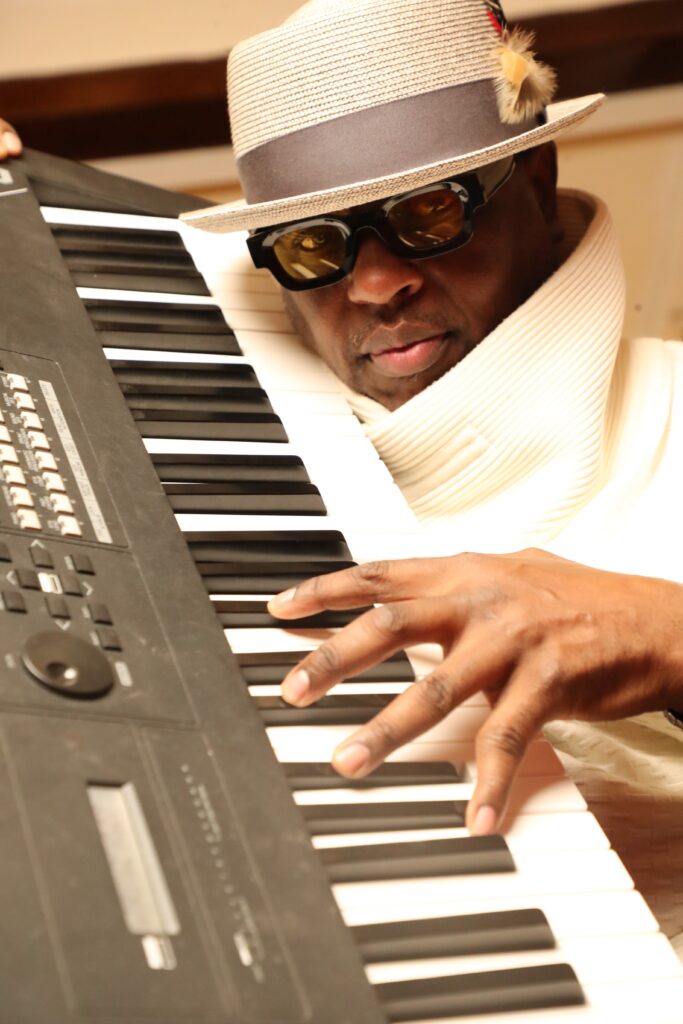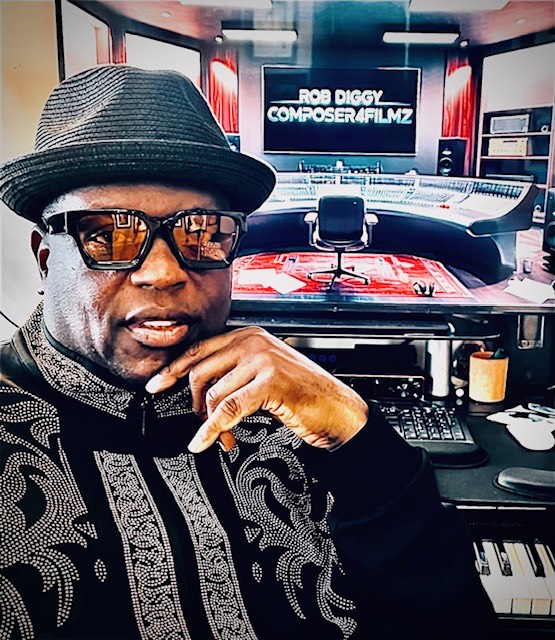
Exclusive interview with Courageous Men Magazine presented by Courageous Woman Magazine
Rob Diggy Morrison is a Grammy-winning composer, producer, and arranger whose sonic fingerprint spans chart-topping remixes and cinematic TV scores. Named one of Courageous Men Magazine’s Top 10 Men to Watch in 2025, Morrison’s journey has taken him from humble beginnings to shaping the sound of cultural moments—from Beyoncé’s Crazy in Love remix to the pulse-pounding score of BET’s The Family Business. Known as “The Sixth Man of Music,” he thrives on stepping in at the decisive moment, elevating a project’s impact and leaving a lasting emotional mark on audiences worldwide.
Rob Diggy Morrison: They started calling me The Sixth Man of Music because, much like in basketball, I come off the bench at a crucial time—not during the game itself, but in the post-production phase where scoring happens. When a project needs that final lift—whether it’s fire on a remix, cinematic weight in the score, or simply someone who understands the emotional moment—I step in and elevate the entire experience.
To me, it means I’m not just a creator, I’m a closer. I’m usually one of the last people to touch a film before it’s complete, and it’s my job to make sure the music hits home and the client feels everything they imagined… and more.
RDM: The creative process was one of those “show up and grind” kind of days, but magic found its way in. Beyoncé didn’t need to be in the room; her a cappella tracks spoke volumes. I’d listen closely to her vocals, really feel them, and then ask myself: What colors do I need to add to make this shine even brighter?
The soul of that remix came from the music—the deep, driving bass line, the rhythmic chords on the keys, and those sharp guitar pick lines that added bite and flair. Everything had to lock in around her voice, not compete with it. What we ended up with was a dance remix that earned its place in club history. To this day, that record still gets people moving—and that’s the real reward.
RDM: I wanted to craft themes that would stick with people—music that felt like a character in the story. I leaned heavily on pulsating arpeggios, throbbing bass lines, and subtle atmospheric pads that ebb and flow. Those textures guide the story without overpowering it. Honestly, without the incredible sound libraries I work with, I wouldn’t be able to execute at this level.

RDM: UAPB gave me more than an education—it gave me rhythm, resilience, and a tribe. The HBCU experience teaches you how to innovate with limited resources, how to hustle with grace, and how to lift as you climb. I carry that energy into every studio, every scoring session, and every time I mentor the next Rob Diggy in the making.
RDM: First: know your craft. Second: know your worth. Third: don’t chase trends—create them. I teach my students to score with soul, not ego. Music is emotional architecture; build something people can live in. And never forget:
RDM: That was my first time directing an orchestra of that size, and it was nothing short of mind-blowing. Every part of the score was fully transcribed for the Sophia Session Orchestra, and they brought it to life beautifully. That experience deepened my connection with orchestral music. Now, when I score films, those rich, live textures are part of my DNA.
RDM: Honestly? Purpose over trophies. I’m just a vessel. The gift doesn’t belong to me—it flows through me. I stay grounded by remembering where I came from and who’s watching. There’s always another young dreamer listening to my work thinking, “If he did it, maybe I can too.” That’s why I keep going.
RDM: The Family Business Season 6 is turning up the volume. Expect epic moments and emotional weight behind every twist.
A Boy Named Bobby is a different kind of journey—this one goes straight to the heart. The score had to be delicate but powerful, pulling you in cinematically and tugging at your heartstrings.
Then, I’m also scoring for Walter King’s The Spellbinder, an incredible illusionist show. The music there has to capture mystery, magic, and suspense all at once. It’s theatrical, unexpected, and full of surprises.
RDM: First: study everything—music theory, storytelling, sound design, the works. Second: don’t just learn how to compose, learn how to communicate. Directors need translators, not magicians. Lastly: build real relationships. Talent opens the door, but trust keeps you in the room. And above all, listen. The best composers are the best listeners.
Rob Diggy Morrison has proven that when the moment calls for music that transforms the story, he’s the one you want on your team. A creator. A closer. The Sixth Man of Music.

Join the thriving community of Courageous Woman Magazine. We have been dedicated to empowering women in business for over 14 years. Don’t hesitate to step into the spotlight! Courageous Woman Magazine is here to illuminate and showcase your brand, products, and services, helping you reach a wider audience!

